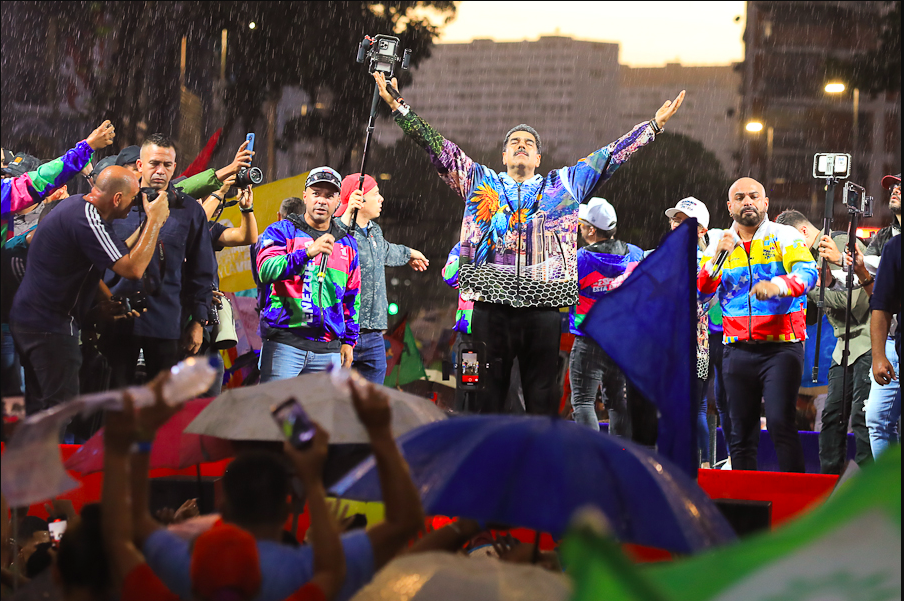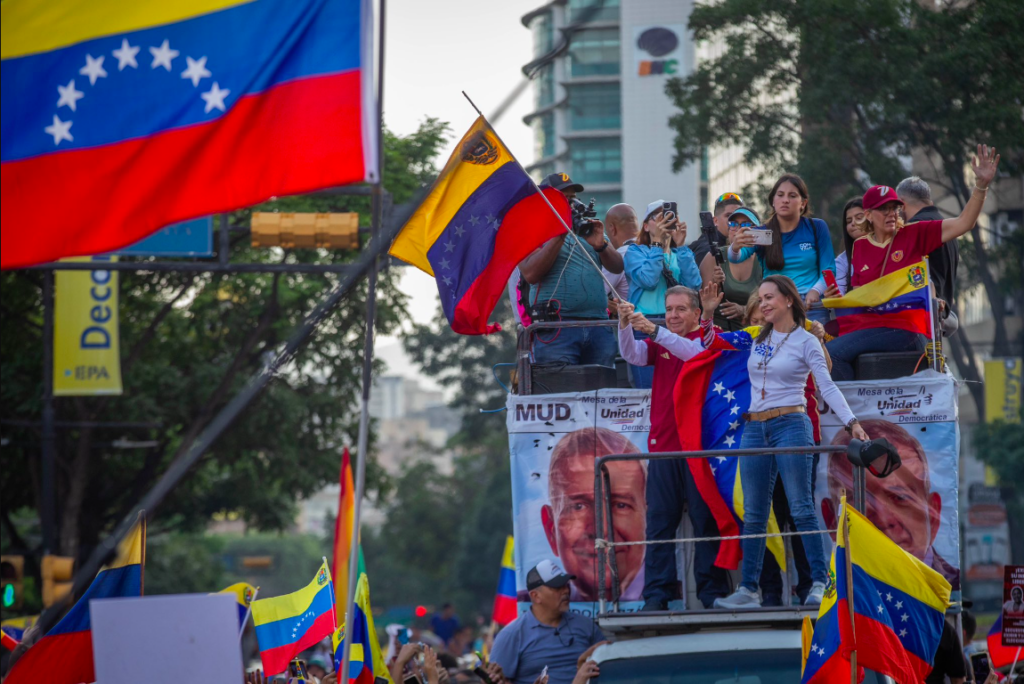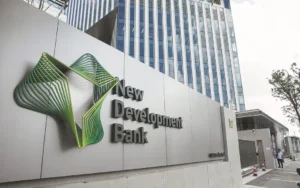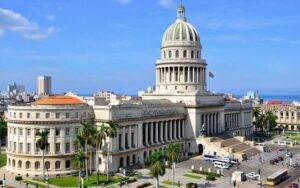
Published 07/22/2024 17:43
With their eyes set on next Sunday, July 28, Venezuela’s different political coalitions will end their electoral campaigns on Thursday night (25), shaking up the political scene with massive demonstrations in support of both the ruling party and the opposition’s proposals. More than 21 million Venezuelans will be able to choose their next president.
The United Nations Panel of Election Experts arrived in Caracas to monitor the electoral process, reinforcing the transparency and technological robustness of the elections. More than 635 international observers confirmed their participation, ensuring rigorous monitoring of the election.
Some characteristics are defining the two main opposition blocs: Chavismo, centered around the candidacy of Nicolás Maduro, and a part of the opposition that is betting on Edmundo González Urrutia.
As the country prepares for the presidential elections on July 28, both the government and the opposition are stepping up their strategies and mobilizations. With a recovering economy and a highly polarized political environment, Venezuela is heading towards a historic electoral process, marked by intense participation and national and international vigilance.
With your feet on the economy or your hands on research
This electoral process takes place amid an improvement in the Venezuelan economy, which recorded inflation of 1.5% last May, the lowest in the last 20 years, according to the Central Bank of Venezuela (BCV). The International Monetary Fund (IMF) itself predicted that Venezuela will be one of the Latin American countries with the greatest growth opportunities in 2024.
The electoral campaigns, which formally began on July 4, have shown different strategies among the main blocs. The governing Chavismo, led by Nicolás Maduro, has focused on strengthening the organizational structure of the United Socialist Party of Venezuela (PSUV), which includes community structures that maintain direct dialogue with the population.
Chavismo understood that ensuring victory in the July 28 elections in Venezuela is not limited to mobilization, but requires an efficient machine that works in a synchronized, auditable and proven way, aligned with Maduro’s strategies and lines of action, and whose basis is dialogue with the people.
This strategy may be a response to the unprecedented circumstances surrounding these elections — the country has been under nine uninterrupted years of sanctions and the candidate seeking reelection is under an international arrest warrant — which requires strengthening ties with the electorate at the local level. As the world’s largest oil producer and dependent on the country’s oil industry, the Venezuelan economy has been hampered by US sanctions that hinder extraction and refining, as well as access to international markets.
Unlike the opposition’s offer, Chavismo can speak openly about its candidate’s government program, centered on the country’s capabilities, without resorting to the neoliberal policies of privatization and reduction of the State proposed by the opposition.
The government of Nicolás Maduro emphasizes its commitment to national development through a strategy that values the country’s internal capacity. Maduro emphasizes the need to strengthen the Venezuelan productive sector, moving away from neoliberal policies that, according to him, would weaken national sovereignty and the economy. The president has promoted a new economic model that seeks to democratize credit and eliminate taxes that burden internal financial transactions in bolivars.

Maduro highlights the government’s economic achievements, such as controlling inflation and achieving exchange rate stability. In contrast, the opposition led by Edmundo González Urrutia has relied on the narrative of “overwhelming” popular support, using polls to support this perception. However, María Corina Machado’s constant presence in opposition activities ends up relegating González and the parties that support him to a secondary role, creating a complex internal dynamic.
Within the opposition ecosystem itself, critical voices have warned of the risks of taking González’s victory for granted based solely on polls conducted by the corporate press. Francisco Rodríguez, a political analyst, believes that polls may be overestimating the opposition vote, which projects a distorted image of the population’s true electoral preferences. Luis Vicente León, another analyst, reinforces that the electoral dynamic is much more complex than the campaigns and electoral jingles indicate. He points out that popularity does not guarantee victory, citing international examples such as the defeat of Marine Le Pen in France, who went from being the favorite to finishing in third place.
There are fears that if the results are not favorable to the opposition, this could lead to violent mobilization, supported by a narrative of fraud and ignorance of the results. Chavismo, for its part, continues to strengthen its electoral base through organization and mobilization, maintaining a firm stance in defense of peace and democratic stability.
The fatigue of the coup adventure
Election campaigns reveal a common point among almost all candidates: the defense of national democracy, non-foreign interference and economic progress. Each candidate, however, presents his or her own nuances and approaches to achieving these goals.
Maduro reaffirmed these principles during his campaign, highlighting the importance of a broad national dialogue involving all social, political and economic sectors. He announced that, if re-elected, he will sign a decree the day after the July 28 elections to formalize this commitment. Maduro highlighted recent economic advances, pointing to the lowest reduction in inflation in 39 years as a result of a “national, business and collective effort.”
Maduro, in a speech to 1,500 businesspeople, promised a new production model based on dialogue with the private sector and the elimination of the Tax on Large Financial Transactions (IGTF) in bolivars. He highlighted the crucial role of businesspeople in overcoming the pandemic and economic sanctions, promising one million new loans for entrepreneurs, young people and women. The president criticized the economic model dependent on oil, proposing a new model based on domestic production.
Claudio Fermín, candidate for the Soluciones para Venezuela party, also supports national unity and has proposed a “government of political breadth” that would involve all sectors of society. Fermín criticized the idea of overthrowing the government at any cost, citing coups and foreign interference as harmful strategies that worsen the crisis.
Luis Eduardo Martínez, from the Acción Democrática party, emphasized the need to work together for a better Venezuela, regardless of party affiliation. In an interview with Radio Nacional de Venezuela, he highlighted the difference between in-person campaigning, marked by the desire for participation and peaceful resolution, and social media campaigns, often dominated by insults and fake news.
Six opposition mayors have declared their support for Maduro, claiming to defend peace and democratic stability. They have rejected extremist violence and any attempt to return to “useless diatribe.” Félix Rivas, from Carabobo’s Vente Venezuela Party, has withdrawn his support for Edmundo González, citing that his candidacy represents a “leap in the dark” that is dangerous for democratic stability.
The latest news about the dispute
After the continuous reelections of the current Chavista bloc, with violent opposition that sabotages the electoral process itself, for the first time, alternative candidates are proposing to compete for the hearts and minds of Venezuelans within the electoral rules.
The nine opposition forces — Democratic Unitary Table (MUD), Hope for Change, First Venezuela, Digital Arepa, Pencil Alliance, Solutions for Venezuela, People-Centered, Democratic Action and the National Democratic Confederation — reveal the diverse dimension of politics in Venezuela, despite the apparent polarization into two blocs in the last elections.
For the second time, an evangelical candidate (Javier Bertucci) is running in a presidential election. In 2018, Bertucci obtained more than a million votes, positioning himself as the third largest national force. The Maranatha Church, the main pillar of his mobilization apparatus, has grown steadily in the interior of the country in recent years.
Antonio Ecarri is the candidate who seeks to exploit the political center electorally. In the 2021 regional elections, Ecarri positioned himself as the second force in Caracas, surpassing the MUD candidate in votes.
Businessman and comedian Benjamín Rausseo (known for his character Er Conde del Guácharo) is taking his presidential candidacy seriously, trying to capitalize on the large number of undecided and independent voters. He can no longer be seen as the “folkloric element” of previous years.
The most radical wing of the opposition is running an election with a candidate with no previous government experience, breaking with the idea of using governorships as a means of publicizing management. It is also the first time that a “delegate candidacy” agreed upon by the traditional parties has been outlined.
In addition to these surprises, the most prominent unions representing businesspeople have shown a neutral public attitude towards the candidates, avoiding politicization within their structures. This “each in his place” stance is a novelty in the Venezuelan political scene.
With information from Comunicasul
Source: vermelho.org.br

